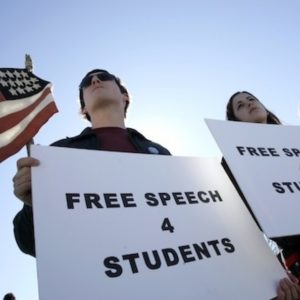The recent D-Day anniversary celebrations provided a good opportunity to consider what happened after World War II ended. Half of Europe was liberated and rebuilt — while half fell behind the Iron Curtain for the next 44 years. Many Eastern bloc nations built out highly effective surveillance states to enforce order, enlisting people to report on their fellow citizens for perceived disloyalty and infractions of the law.
In the German Democratic Republic — East Germany — the system was particularly brutal; the 2006 film “The Lives of Others” dramatized the agony of average citizens who knew they were being monitored at all times, which led to tremendous mistrust among neighbors and colleagues. Fortunately, the fall of the Berlin Wall and the dismantling of the Stasi apparatus brought this shameful period to an end.
As it turns out, however, these policies aren’t completely gone — they’ve just migrated west, operating on hundreds of American college campuses under the modern-day guise of a “bias response team.”
At the University of Illinois Urbana-Champaign, students are encouraged to report on alleged “bias incidents” committed by their fellow students — and to do so anonymously, if they so choose. Using terms like “victim” and “offender” to frame the report, students are prompted to speculate on the reason for the incident (including but not limited to race, sexual orientation or socioeconomic class) and to assert how bias was demonstrated: discriminatory treatment, graffiti/vandalism, harassment/threat, offensive language, physical assault/battery, sexual misconduct, social media, spoken communication, or written communication. Supporting documentation can be included, but is not required.
Some of those categories — physical assault/battery, sexual misconduct and discriminatory treatment — are against the law, as they should be. But what’s notable is that the majority of the “incidents” that students are encouraged to report covers speech and expression. Let that sink in: speech. On a public university campus.
Now remember: The University of Illinois is a state actor, and as such is bound to uphold the First Amendment. That means that even if the school dislikes or disapproves of some of the speech that students use — be it written, spoken, as a social media post, or “offensive language,” the school can’t ban it. Yet that is exactly what the university’s Bias Assessment and Response Team (BART) is seeking to do.
What happens if a student is named as an “offender” in one of the reports? A BART official will contact him or her, informing the student that the BART has received a bias report and that they need to speak with the student to discuss the allegations. The official won’t identify the person who has accused the student of “bias” or inform the student of any rights he or she may have — impeding the student’s self-defense.
If the team determines that a bias incident has occurred, it will impose various corrective measures on the “offender,” including but not limited to “educational conversations,” “mediation (and) facilitated dialogue,” “resolution agreements,” “referrals to other offices and/or programs,” and “educational referrals.” In addition, BART will also record the details of the incident on the student’s permanent record, making this information available to others outside BART.
BART publishes a detailed annual report each year, which provides both a quantitative and qualitative log of alleged bias incidents on campus. Indeed, many of the incidents deal with speech — which, while in some cases ugly, is still constitutionally protected — meaning that students have been dragged into meetings with school administrators on the basis of speech alone.
Indeed, this process is meant to be intimidating. There is a natural power dynamic that exists between student and administration. And with that in mind, students who don’t want to go through this experience do the logical thing — they refrain from discussing controversial subjects out of an abundance of caution. If there’s the possibility of getting reported by a classmate, far better to avoid the hassle altogether.
These policies have been designed to — and have the effect of — silence controversial voices and opinions. It’s time to put an end to policies like this on American college campuses — forever.

